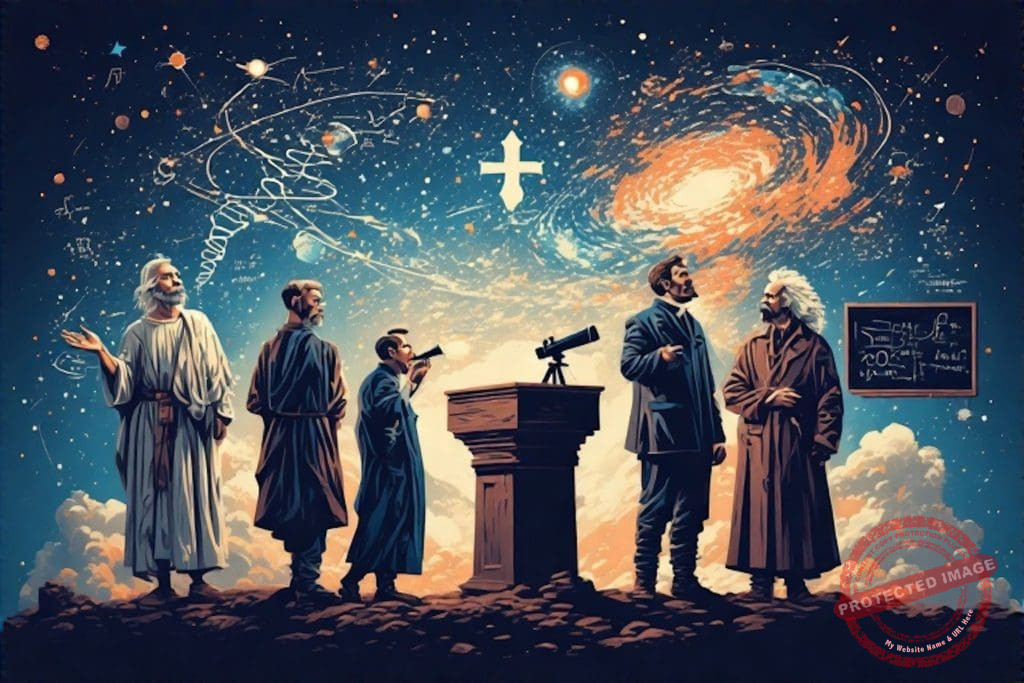
The Eternal Debate: Universe and Worldview
What (or who) created the universe? The question isn’t just philosophical—it’s personal. Whether you’re religious, secular, or somewhere in between, your answer shapes how you see yourself, your purpose, and what matters in life. From ancient prophets to modern physicists, humanity has wrestled with this very issue. The universe and worldview you choose to believe in will inevitably influence your ethics, priorities, and peace of mind. This debate is not going away. It’s been with us since the beginning—and it’s still raging today.
Let’s examine how different thinkers throughout history have approached this question and the consequences of their beliefs. You may find that you’ve already adopted one of these views—perhaps without even realizing it.
Spinoza: God Is the Universe
The 17th-century philosopher Baruch Spinoza believed that God and Nature are one and the same. There was no moment of creation; rather, the universe is a necessary expression of God’s nature. For Spinoza, God isn’t a personal being but the sum total of existence. In this view, to understand the laws of nature is to understand divinity. This pantheistic view reduces the need for prayer, miracles, or personal intervention—everything simply is.
This aligns closely with what theologian John Lennon once observed: that secular people often say the universe created itself, which ultimately places “godhood” within the material universe. This universe and worldview implies that meaning must be derived from within nature itself, not from beyond it.
Unitarian Universalism: A Modern Echo of Spinoza
Unitarian Universalists (UUs) embrace a worldview strikingly similar to Spinoza’s, seeing the divine not as a personal being but as the interwoven fabric of existence itself. Their Seventh Principle affirms “respect for the interdependent web of all existence,” mirroring Spinoza’s belief that God and Nature are one. Rather than looking beyond creation for meaning, UUs find it within—through science, reflection, and awe of the natural world.
Without relying on divine commands or miracles, UUs emphasize personal responsibility to do good. Their Second Principle, “justice, equity and compassion in human relations,” captures their ethical core. Believing that meaning is something we help create, not something we receive, they lead efforts in racial justice, LGBTQ+ rights, and environmental advocacy. In many ways, Unitarian Universalism brings Spinoza’s philosophy into the heart of modern social action.
Einstein and Hawking: Awe Without a Creator
Albert Einstein famously said, “I believe in Spinoza’s God,” meaning he rejected a personal deity but felt reverence for the elegant order of the cosmos. He didn’t pray or worship in any traditional sense but found a kind of spiritual satisfaction in understanding natural laws.
Stephen Hawking went further. He argued that the universe could spontaneously create itself given the laws of gravity, essentially removing the need for any creator at all. Hawking’s universe and worldview was rooted in physics, not metaphysics. The implication? We are the accidental outcome of impersonal forces—so morality, purpose, and love must be self-generated.
Yet this worldview can leave many feeling adrift. If nothing designed us, and no final judgment awaits us, then what ultimately grounds our morality or fuels our hope?
Aquinas and Traditional Theism: God Outside Creation
In contrast to Spinoza’s pantheism, thinkers like Thomas Aquinas argued for a transcendent Creator who exists outside the universe. Aquinas taught that the universe is contingent—it does not explain its own existence and cannot be the source of its own being. Therefore, he reasoned, there must be a necessary, eternal, and uncaused being who brought it into existence. That being is God—not just an abstract force, but a personal, rational, and purposeful Creator who continues to uphold all things.
This traditional theistic worldview gives rise to foundational values: human dignity because we are made in God’s image; moral accountability because we are answerable to a moral lawgiver; and hope in suffering because God’s story for our lives doesn’t end in death or randomness. If we are created for a purpose, then meaning isn’t something we invent—it’s something we discover. In this view, prayer is not wishful thinking; it is conversation with the One who made us.
Marx and Hitler: The Weaponization of Worldview
While Marx was not a cosmologist, his atheistic materialism functioned as a worldview: religion was “the opiate of the masses.” He believed all of history was driven by economic struggle, not divine intervention. If there is no God, then moral values are human inventions—and justice must be achieved through revolution, not revelation.
Adolf Hitler, meanwhile, espoused a kind of twisted naturalism. Though he referenced God occasionally in public, his private beliefs (as seen in Mein Kampf and his speeches) reveal a Darwinian, survival-of-the-fittest worldview. His god was race, power, and blood. The result? One of history’s most horrifying genocides—justified through a worldview that saw no transcendent moral order.
These examples show that the universe and worldview we adopt has real consequences—not just for individuals, but for entire societies.
Faith and Fulfillment
Each of us eventually adopts a worldview. Maybe you see the universe as random. Maybe you see it as self-created. Or maybe you believe it was designed by a loving God. But make no mistake—your worldview is not neutral. It shapes how you treat others, how you face suffering, and how you define success.
Belief in a personal God doesn’t just shape theology—it reshapes the human psyche. Numerous studies across disciplines show that people who believe they were intentionally created—not randomly assembled—report significantly lower levels of anxiety and despair. Why? Because their worth is not tied to performance, productivity, or popularity. It is anchored in divine love.
Higher Stakes at the End
This becomes especially vital as people age. When careers wind down, bodies weaken, and independence fades, those who’ve built their identity on self-determination often experience a crisis. But those with a higher calling—those who see their lives as part of a divine story—tend to meet this season with surprising peace. They understand that their value doesn’t diminish with their strength. In fact, their legacy often grows as they invest in others, pray more deeply, and pass on wisdom that springs from years of walking with God.
“Even to your old age and gray hairs I am he, I am he who will sustain you. I have made you and I will carry you; I will sustain you and I will rescue you.” — Isaiah 46:4 (NIV)
When Self-Made Meaning Fades
Not everyone enters their later years with peace. Many well-known secular thinkers, despite fame, creativity, or success, have openly wrestled with the void that often emerges when self-made meaning begins to falter. Without belief in a higher power, the search for purpose becomes increasingly fragile—especially in the face of aging, loss, and mortality.
Woody Allen
Take filmmaker Woody Allen, for example. Long celebrated for his wit and prolific storytelling, Allen has spoken candidly—and often bleakly—about his worldview. “Life is full of misery, loneliness, and suffering—and it’s all over much too soon,” he once quipped. But behind the humor lies a deep existential dread.
He is also noted for saying: “One must have one’s delusions to live. If one looks at life too directly, it becomes unbearable to live,” and, “The best you can do to get through life is distraction… Love works as a distraction.”
These quotes reflect his worldview—charming existential defensiveness and self-created mental buffers in the face of meaninglessness.
In interviews, Allen has admitted that his films, awards, and artistic legacy bring him “no comfort” in the face of death. His secularism leaves him without answers to the most profound questions, particularly as time slips away: Why does any of this matter?
Bertrand Russell
Another prominent example is Bertrand Russell, the famous British philosopher and outspoken atheist. In his earlier years, Russell’s universe and worldview championed reason, logic, and science as the foundation for truth and morality.
But in his later writings, a more somber tone emerged. He acknowledged the “unyielding despair” at the heart of atheism, stating that humans must build their lives upon “the firm foundation of unyielding despair.” Even his intellectual brilliance could not dispel the looming shadow of meaninglessness.
The Weight of Time
These men are not anomalies. They represent a growing pattern among secular thinkers: the tools that build identity, acclaim, and even legacy can crumble under the weight of time if there is no transcendent purpose behind them. When control fades and accolades go silent, the soul asks deeper questions that art, science, and logic alone cannot answer.
In contrast, those grounded in faith often find clarity in their final chapters. Their lives are not defined by achievements but by relationship—with God, with others, and with eternity.
The Worldview That Carries You
What becomes clear through these stories is that no one escapes the deeper questions—Why am I here? What happens when I’m gone? Did my life matter? The universe and worldview we envision—whether built on faith or formed in its absence—will either prepare us to face these questions or leave us scrambling for meaning when it matters most.
Those who believe in a personal God often age with a kind of spiritual resilience. They are not immune to grief or decline, but they face it with assurance: that their identity is fixed, their value is enduring, and their future is secure. Their faith gives them a lens through which even suffering can have meaning. Their prayers are not just rituals; they are lifelines.
By contrast, even the most brilliant or creative secular minds can struggle with an emptiness that intellect alone cannot fill. When the spotlight dims and control fades, only a deeply rooted worldview—one that speaks to eternity—can carry a person through.
So, whether young or old, it’s worth asking: Is my notion of universe and worldview one that can walk with me all the way home?
Clara’s Walk with Faith
Consider the story of Clara, a retired nurse in her late seventies. She was not famous like Woody Allen or Bertrand Russell. She did not make movies or write best selling books. She was an average person, like you and me.
After losing her husband and undergoing major surgery, she moved into assisted living. Many of her friends became withdrawn and depressed, but Clara began leading a small Bible study in the facility’s library.
“I may be slowing down,” she said with a smile, “but the Lord’s not finished with me yet.” Residents who once stayed in their rooms began showing up. Loneliness gave way to laughter. Clara didn’t see her life winding down—she saw it ripening.
Purpose in youth is one thing. But purpose that endures through suffering—that’s something only faith can provide. Clara’s universe and world view directly shaped her approach to life.
Solomon in Ecclesiastes: From Emptiness to Eternity
Perhaps no voice captures the search for meaning, universe and worldview better than King Solomon in the book of Ecclesiastes. Despite unparalleled wealth, wisdom, and power, Solomon described the material world as ultimately hollow. He wrote,
“I have seen all the things that are done under the sun; all of them are meaningless, a chasing after the wind” (Ecclesiastes 1:14).
Solomon didn’t reject knowledge, pleasure, or work—but he exposed their limitations when pursued apart from God. He tried everything: lavish feasts, romantic indulgence, massive building projects, and deep study. Yet again and again, he concluded,
“Everything was meaningless, a chasing after the wind; nothing was gained under the sun” (Ecclesiastes 2:11).
In the end, Solomon pointed to a singular conclusion that rises above human striving:
“Fear God and keep His commandments, for this is the whole duty of man” (Ecclesiastes 12:13).
Only in reverence and relationship with the Creator does lasting meaning emerge.
Call to Action: Examine Your Belief
What do you believe created the universe? Are you confident in that belief? Does it bring peace? Purpose? Accountability? Or does it leave you restless, untethered, or cynical?
Take time to reflect on the worldview you’ve inherited—or adopted by default. Ask yourself:
- Do my beliefs explain both the beauty and brokenness of life?
- Does my belief system call me to something higher than myself?
- Does it equip me to love others well, even when it’s hard?
You don’t need to have all the answers to begin the search. But ignoring the question won’t make it go away. It’s written in the stars, whispered in suffering, and etched into every human heart: Why are we here? And who put us here? Your answer may just change everything.
About Raleigh Acupuncture
At Raleigh Acupuncture Associates, we are deeply committed to providing the highest quality professional acupuncture while being rooted in strong Judeo-Christian values of love, faith, kindness, and truth. We guide our practice with compassionate care, where each patient is treated with respect and dignity, regardless of their background, faith, or beliefs. We welcome people from all walks of life and strive to create a warm, inclusive environment promoting healing and holistic wellness. Our dedication to delivering exceptional acupuncture is paired with a genuine love for helping others, making our clinic a place where faith and professional medical care come together for the well-being of every patient.
Next Steps
BOOK NOW to schedule an appointment online.
Meet Our Practitioners (Video).
Learn about all the conditions we treat.
Focus Keyphrase: universe and worldview
Image generated with https://perchance.org/ai-text-to-image-generator





Leave a Reply